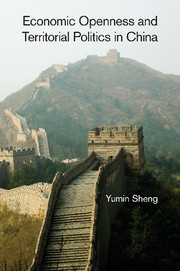Book contents
- Frontmatter
- Contents
- List of Tables
- List of Figures
- Acknowledgments
- List of Abbreviations
- 1 The Territorial Politics of Economic Openness in China
- 2 Globalization, Institutions, and Domestic Territorial Politics: A Theoretical Framework
- 3 Economic Openness and Its Regional Dimension
- 4 Central Political Control via the CCP
- 5 Global Market Integration and Central Political Control
- 6 Consequences for Fiscal Extraction and Economic Growth
- 7 Globalization, Single-Party Rule, and China's Transitions
- References
- Index
2 - Globalization, Institutions, and Domestic Territorial Politics: A Theoretical Framework
Published online by Cambridge University Press: 10 November 2010
- Frontmatter
- Contents
- List of Tables
- List of Figures
- Acknowledgments
- List of Abbreviations
- 1 The Territorial Politics of Economic Openness in China
- 2 Globalization, Institutions, and Domestic Territorial Politics: A Theoretical Framework
- 3 Economic Openness and Its Regional Dimension
- 4 Central Political Control via the CCP
- 5 Global Market Integration and Central Political Control
- 6 Consequences for Fiscal Extraction and Economic Growth
- 7 Globalization, Single-Party Rule, and China's Transitions
- References
- Index
Summary
INTRODUCTION
Burgeoning political economy research has probed the dynamics between global market integration and national political disintegration. In particular, prevailing economic theories forecast rising secessionism and inevitable state breakups, but they confront an ambivalent empirical record. Indeed, our replication exercise based on a large cross-national sample and reported later in this chapter furnishes little evidence that economic globalization is unambiguously linked to decline of national-level political authority. In this chapter, I highlight the utility of an approach privileging the national rulers. I argue that national political leaders who rule with the help of centralized political parties will resort to exerting tighter political control over the subnational governments in the winner regions of the global markets in order to facilitate resource extraction, mitigate regional disparity, and prolong their national rule.
Centralized political parties governing at both the national and subnational levels impart to the national political leadership the institutional wherewithal to wield regionally selective political control – for instance, via personnel powers over copartisans staffing the subnational governments. Appointing agents who are more likely to comply with the policy preferences of their national superiors enables the center to exercise a greater degree of political control over the regional governments that these agents lead. Thus, national leaders who rule with the help of centralized political parties can exercise varying degrees of political control over the different subnational governments through appointing different types of officials to the regional government leadership positions.
- Type
- Chapter
- Information
- Economic Openness and Territorial Politics in China , pp. 20 - 48Publisher: Cambridge University PressPrint publication year: 2010



